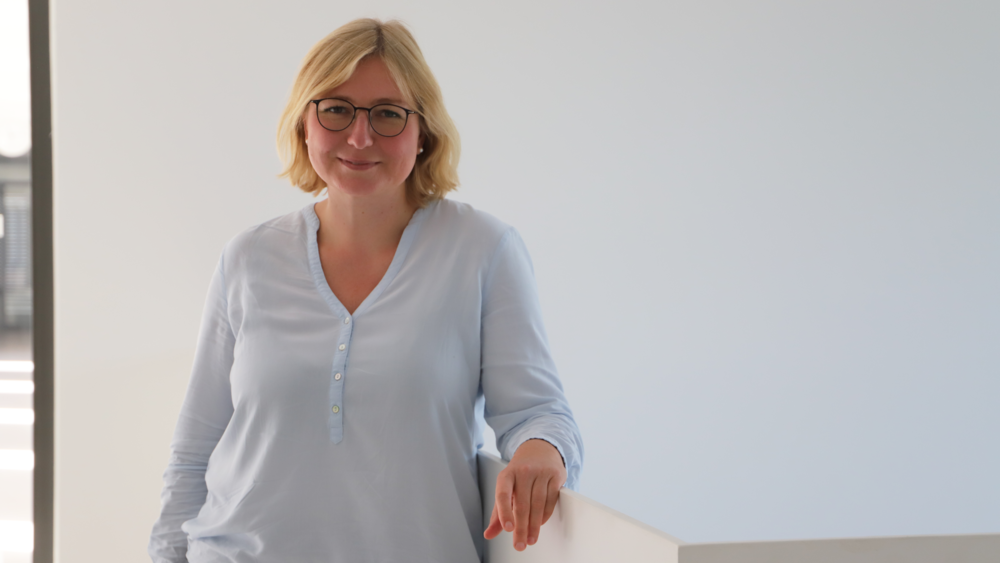Almuth Müller will take over the management of the Rector's Office in future. She has experience in Eastern Europe, has worked as a university lecturer and project collaborator and is looking forward to the new challenge.

She speaks fluent Russian, can hardly wait to move to the Polish border and has a very unusual hobby. Ms. Almuth Müller M. A. is the new assistant to the Rector. As such, she will take over the management of his office in future and is responsible, among other things, for coordinating the interface between the Rectorate and the faculties, the central facilities, the University Administration and the staff units.
The 36-year-old, who comes from the Ore Mountains, brings with her a wealth of experience in teaching as a university lecturer and as a project employee in Eastern Europe.
She also has expertise in project management, administration and adult education, as a multiplier in the field of higher education policy and in German-Russian/Russian-German translation.
Ms. Müller succeeds Dipl.-Ing. Hella Trillenberg, who is retiring at the end of the year after a career of more than 34 years at Zittau/Görlitz University of Applied Sciences.
The Public Relations Office met Almuth Müller for an interview.
Ms Müller, you completed your Master's degree in Politics, Administration and International Relations and most recently worked as a language trainer. What made you decide to apply to Zittau/Görlitz University of Applied Sciences?
Two things. Firstly, I wanted to apply directly to Zittau/Görlitz because of my Eastern European experience. I spent six years traveling in Belarus and Russia and studied Slavic Studies, i.e. Russian and Polish, in my first degree. The proximity of the HSZG, especially to its partners in the Czech Republic and Poland, convinced me. The second point was that, as a result of my second degree, a consultant position turned out to be my dream job. I wanted to work in an interface position between administration, strategy and politics in the form of political measures and programs. And then there is the international aspect. Everything is bundled together here in the border triangle.
A summer semester dominated by corona lies behind the university. You are starting at a time that is characterized by upheaval. How did you prepare for the position of lecturer?
I did a lot of research into how the university has dealt with the coronavirus crisis so far, for example whether face-to-face teaching was taking place or everything was online, or whether it was even possible to enter the building. The information was all available to me on the university's website.
How do you see yourself in your new role? What do you think awaits you?
I think it will be a very varied job. You have to keep an eye on a lot of things, because there are also a lot of requests from outside. For example, you have to act as an interface between the Rector, the Deans and the faculties. Perhaps mouthpiece would also be an appropriate term here.
Speaking of mouthpiece. You worked as a language trainer and tutor for German as a foreign language and lived in Russia for a long time. Where did your interest in the Russian language come from?
I can't answer that exactly. I was very interested in Russian as a child. I sat down and learned the Cyrillic letters quite voluntarily, but I don't know where it ultimately came from. At least not from my parents (laughs). They were rather averse to Russian because of their experiences in the former GDR. In fifth grade, I had a teacher who was a big fan of Russia. Perhaps she influenced me to a certain extent. She had made many trips to Russia and brought us children little Russian chocolates on her return and raved about the country.
So love goes through the stomach, even in academic careers. You worked for the DAAD (German Academic Exchange Service) in Belarus and Russia as a multiplier in the field of higher education policy, among other things. What culturally influenced "Russian" view of German universities do you bring with you?
German universities are perceived as very professional. The German academic system is considered to be very good and is associated with top positions in the world. There are many Russian students who like coming to Germany to study, who say: "If I have a German university degree, then I represent something and can go back to Russia with it!" The German university landscape is very highly regarded.
You also worked for the United Nations in Geneva. What was your task and do you see any parallels with your new job?
I was an intern there as part of my second degree. There are indeed parallels. I organized many UN-wide events as part of my administrative work. You had to mediate a lot between the individual partners and UN organizations and gather information accordingly.
What are your private interests? What are your hobbies?
Apart from Russian, Polish is a great hobby of mine, which I would like to revive now that I live here on the Polish border. Apart from that, I love cycling and swimming and am happy about the many opportunities the region offers me for this.
You are a pen pal for a prison inmate. What prompted you to do this?
It's a very important thing for me and for the person I'm writing to. I really enjoy writing handwritten letters or postcards to friends when I'm on vacation. I wanted to get involved and combined the two. I thought about what would be the biggest punishment for me. Clearly, it would be if I was locked up, couldn't get out or couldn't see the sky. That's why I think about the people who are in prison. For me, writing letters takes relatively little time, but the impact is huge.
The interview was conducted by Cornelia Rothe M.A.